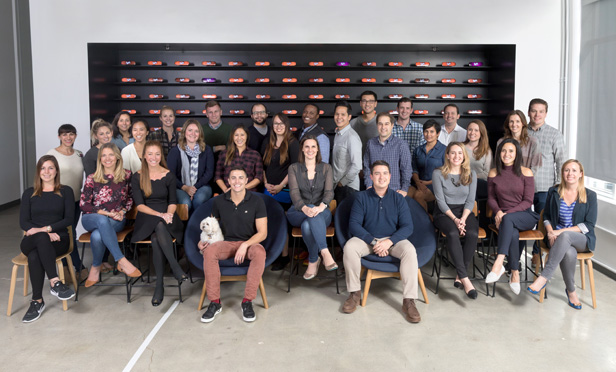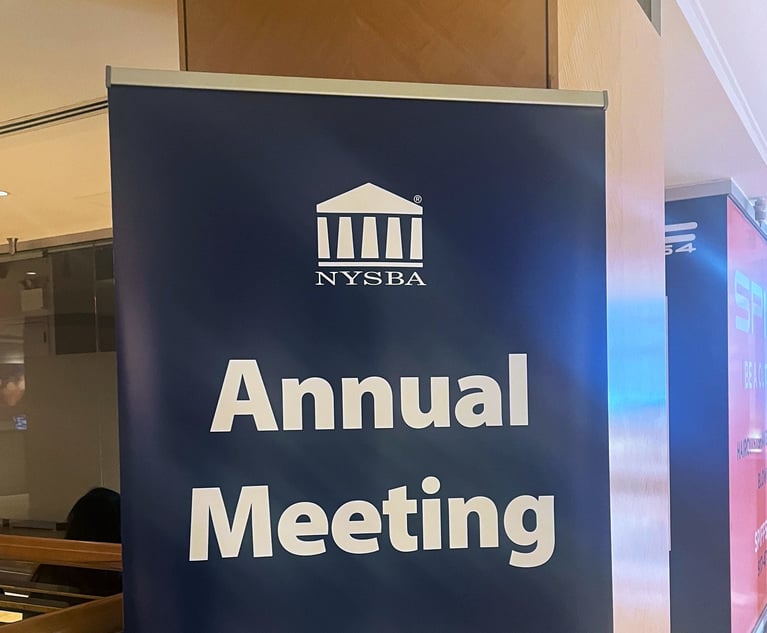Legal Departments of the Year, Overall, Emerging Companies: Lyft
It's unusual to hear a law department called "one of the most beloved teams" at a company, but Lyft's in-house lawyers have achieved this distinction.
November 13, 2017 at 10:00 AM
6 minute read

Kristin Sverchek, general counsel of San Francisco-based Lyft Inc., joined the company in 2012 as its only in-house lawyer. The following year she hired one more attorney. But it wasn't until her third year that she began to really build out the team.
It has been a successful expansion—three years later, the legal department has yet to lose a lawyer.
“I hate to tell people that because I feel like I'm going to jinx myself,” said Sverchek of her department, now composed of 23 in-house attorneys. “I work really hard to retain the people that I have.”
At a startup, having any lawyers with a tenure of three years is relatively rare, but beneficial because of the institutional knowledge they hold. “They know the business as well as, or in some cases, better, than many of the stakeholders across the company,” Sverchek said.
It's a plus for Lyft that no one has left yet, because the in-house attorneys have their hands full supporting the ride-hailing company, which was valued most recently at $11 billion. In the past year alone, the lawyers settled a $27 million class action suit brought by California drivers, helped Lyft enter the last of 50 states (South Dakota) where it is now operational and have overseen a $1 billion financing round from the investing arm of Alphabet Inc.
“We're a really, really lean team,” Sverchek said. “To be successful in my department, you have to have an extremely high work ethic, be willing to tackle all sorts of stuff and work lots of hours.”
Currently, Lyft's legal department is composed of five verticals—corporate, product and commercial, IP, litigation and employment. Sverchek noted that the majority of lawyers at Lyft are the types of people who “thrive in chaotic situations.”
With Lyft's growth will eventually lead to expansion in the legal department as well—both within the existing verticals and new ones, according to the GC.
For instance, though Lyft already has three to four lawyers who spend some of their time on privacy, the company is looking to hire its first lawyer dedicated solely to privacy issues. And Sverchek says adding lawyers to work on international affairs as the company enters markets outside the United States is “top of mind” for her.
Lyft is also reportedly mulling an IPO in 2018. Sverchek didn't comment on specifics of what an IPO for Lyft would look like, but it would no doubt affect her legal department. “We've been through a number of private rounds of financing since I joined the company, so all in all, I think we're ready to flip the switch on that when and if we think it makes sense,” she said. “We are very used to being diligence- and audit-ready at a moment's notice.”
 Kristin Sverchek, Lyft general counsel
Kristin Sverchek, Lyft general counselIf Lyft does go public, Sverchek anticipates adding more securities experts, post-public offering.
Lyft's lawyers recently inked commercial partnerships with self-driving car startups nuTonomy and Waymo. As Lyft continues to move further into the autonomous vehicle space, Sverchek said that she will have to look for lawyers with backgrounds in areas such as hardware and products liability.
Sverchek said that hiring in the autonomous vehicle field is “really interesting” because “there's a mad dash to specialize in it but no one's really got that background because it's a brand new discipline.”
Many of the legal and regulatory issues Lyft faces are similar to some of those facing rival Uber. Uber, valued at nearly $70 billion, eclipses Lyft in size and has roughly 10 times as many lawyers, but both companies have dealt with certain challenges, including entering new markets across the country where ride-hailing apps were not previously allowed and fighting legal battles brought by its drivers seeking legal designation as employees.
Lyft considers its $27 million settlement in March 2017 with California drivers in Cotter v. Lyft—which preserved drivers' status as independent contractors—to be one of the legal department's biggest wins of the last year.
“That was a really massive cross-functional effort within the legal team,” said Sverchek, who was personally involved, along with lawyers from within the litigation and employment verticals. “That was something when we were first hit with that suit we didn't know how it could possibly be solved and we were able to resolve it in a way that felt good for us and felt good for our drivers as well.”
Another milestone came in December 2016 when Lyft decided to hire its first legal operations executive, Frances Pomposo. “It's whipped us into shape,” Sverchek said.
In the last year, the department implemented a new contract management system and will soon implement a new litigation matter management system, as well as patent and trademark managing systems. “We've been able to really squeeze efficiency in areas that we just never had time to tackle before,” she said.
Sverchek doesn't anticipate leading the legal department at Lyft could become dull any time soon. “I think it's possible, but it's a long ways out,” she said, with a laugh. “There are plenty of different companies that somebody could work at that would be a little tamer, a little less chaotic, but just wouldn't have the same sense of personal satisfaction and accomplishment.”
The lawyers have drawn admiration from beyond the legal department as well.
“One of the things that makes me happy is that my boss, one of our co-founders, John [Zimmer], has remarked on several occasions that the legal team is one of the most beloved teams across the company and is shocked by that because lawyers are usually hated,” Sverchek said. “We wear that as a badge of honor that we are able to be really effective at our jobs but also partner collaboratively with team members across the company.”
This content has been archived. It is available through our partners, LexisNexis® and Bloomberg Law.
To view this content, please continue to their sites.
Not a Lexis Subscriber?
Subscribe Now
Not a Bloomberg Law Subscriber?
Subscribe Now
NOT FOR REPRINT
© 2025 ALM Global, LLC, All Rights Reserved. Request academic re-use from www.copyright.com. All other uses, submit a request to [email protected]. For more information visit Asset & Logo Licensing.
You Might Like
View All
NYSBA Annual Meeting: How In-House Counsel Navigate Gen AI Risk


Apple GC’s Compensation Flat Again in 2024, but She Might Snag No. 1 Spot on Top-Paid List Anyway

After Solving Problems for Presidents, Ron Klain Now Applying Legal Prowess to Helping Airbnb Overturn NYC Ban
7 minute readTrending Stories
- 1Who Are the Judges Assigned to Challenges to Trump’s Birthright Citizenship Order?
- 2Litigators of the Week: A Directed Verdict Win for Cisco in a West Texas Patent Case
- 3Litigator of the Week Runners-Up and Shout-Outs
- 4Womble Bond Becomes First Firm in UK to Roll Out AI Tool Firmwide
- 5Will a Market Dominated by Small- to Mid-Cap Deals Give Rise to a Dark Horse US Firm in China?
Who Got The Work
J. Brugh Lower of Gibbons has entered an appearance for industrial equipment supplier Devco Corporation in a pending trademark infringement lawsuit. The suit, accusing the defendant of selling knock-off Graco products, was filed Dec. 18 in New Jersey District Court by Rivkin Radler on behalf of Graco Inc. and Graco Minnesota. The case, assigned to U.S. District Judge Zahid N. Quraishi, is 3:24-cv-11294, Graco Inc. et al v. Devco Corporation.
Who Got The Work
Rebecca Maller-Stein and Kent A. Yalowitz of Arnold & Porter Kaye Scholer have entered their appearances for Hanaco Venture Capital and its executives, Lior Prosor and David Frankel, in a pending securities lawsuit. The action, filed on Dec. 24 in New York Southern District Court by Zell, Aron & Co. on behalf of Goldeneye Advisors, accuses the defendants of negligently and fraudulently managing the plaintiff's $1 million investment. The case, assigned to U.S. District Judge Vernon S. Broderick, is 1:24-cv-09918, Goldeneye Advisors, LLC v. Hanaco Venture Capital, Ltd. et al.
Who Got The Work
Attorneys from A&O Shearman has stepped in as defense counsel for Toronto-Dominion Bank and other defendants in a pending securities class action. The suit, filed Dec. 11 in New York Southern District Court by Bleichmar Fonti & Auld, accuses the defendants of concealing the bank's 'pervasive' deficiencies in regards to its compliance with the Bank Secrecy Act and the quality of its anti-money laundering controls. The case, assigned to U.S. District Judge Arun Subramanian, is 1:24-cv-09445, Gonzalez v. The Toronto-Dominion Bank et al.
Who Got The Work
Crown Castle International, a Pennsylvania company providing shared communications infrastructure, has turned to Luke D. Wolf of Gordon Rees Scully Mansukhani to fend off a pending breach-of-contract lawsuit. The court action, filed Nov. 25 in Michigan Eastern District Court by Hooper Hathaway PC on behalf of The Town Residences LLC, accuses Crown Castle of failing to transfer approximately $30,000 in utility payments from T-Mobile in breach of a roof-top lease and assignment agreement. The case, assigned to U.S. District Judge Susan K. Declercq, is 2:24-cv-13131, The Town Residences LLC v. T-Mobile US, Inc. et al.
Who Got The Work
Wilfred P. Coronato and Daniel M. Schwartz of McCarter & English have stepped in as defense counsel to Electrolux Home Products Inc. in a pending product liability lawsuit. The court action, filed Nov. 26 in New York Eastern District Court by Poulos Lopiccolo PC and Nagel Rice LLP on behalf of David Stern, alleges that the defendant's refrigerators’ drawers and shelving repeatedly break and fall apart within months after purchase. The case, assigned to U.S. District Judge Joan M. Azrack, is 2:24-cv-08204, Stern v. Electrolux Home Products, Inc.
Featured Firms
Law Offices of Gary Martin Hays & Associates, P.C.
(470) 294-1674
Law Offices of Mark E. Salomone
(857) 444-6468
Smith & Hassler
(713) 739-1250






